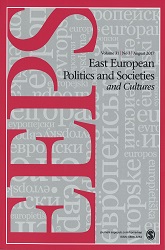Ignorance as an Outcome of Categorizations: The “Refugees” in the Polish Academic Discourse before and after the 2015 Refugee Crisis
Ignorance as an Outcome of Categorizations: The “Refugees” in the Polish Academic Discourse before and after the 2015 Refugee Crisis
Author(s): Anna Horolets, Adriana Mica, Mikołaj Pawlak, Paweł KubickiSubject(s): Social Philosophy, Pragmatism, Social differentiation, Migration Studies, Asylum, Refugees, Migration as Policy-fields
Published by: SAGE Publications Ltd
Keywords: ignorance; categorizations; refugee crisis; Poland; academic discourse;
Summary/Abstract: The article addresses the issue of the so-called refugee crisis in Europe from the perspective of ignorance studies and seeks to establish the mechanisms whereby ignorance is created through categorizations. We depart from the proposal of Proctor and view ignorance as either “native state,” “lost realm,” or “strategic ploy.” In all three, ignorance is an unalienable part of social action. The case of Polish academic research on refugees before and after 2015 is explored in order to establish who ignores what, when, and why, when categorizing, and to analyze the relationship between ignorance and social action. In the Polish refugee field, the crisis of 2015 was the moment when the refugee issue stepped out of the shadows and attracted the attention of the public and policymakers. The analysis of the category “refugee” in Polish scholarship before 2015 demonstrates that the category was based on culturalization and idealization; thus, the socio-political and pragmatic aspects of the group’s characteristics and actions were systematically ignored, and the ignorance worked as a “lost realm.” After 2015, a new body of scholarship emerges in which the category “refugee” acquires negative connotations with security threat or fakeness. In the new scholarship, ignorance is a strategic framing that sets the category of “refugee” outside the humanitarian issues. We claim that the new categorizations follow the logic of culturalization and moralization typical of the previous period. Strategic ignorance inherent in the categorizations that dichotomize “good” and “bad” refugees, or “refugees” and “migrants,” unlocks the potential for political action.
Journal: East European Politics and Societies
- Issue Year: 34/2020
- Issue No: 03
- Page Range: 730-751
- Page Count: 22
- Language: English
- Content File-PDF

